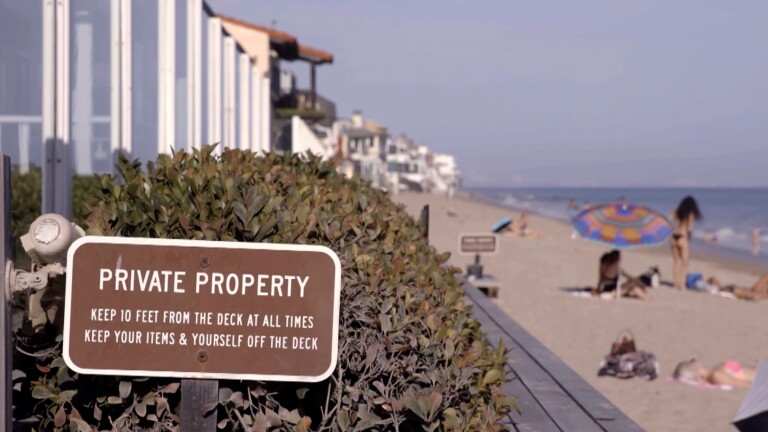
Growing Sea Lion Population a Nuisance for Some Port Town Residents
It's man vs. nature -- in particular, sea lions. The battle is taking place in Southern California harbors like Newport Beach and Marina del Rey. Those quiet communities are not so quiet these days. Sea lions have made themselves at home in exploding numbers. They're basking on docks, sunbathing on boats, and barking -- day and night. What's a boat owner to do?
TRANSCRIPT:
Val Zavala/Reporter: Pasadena has peacocks. The Hollywood Hills have coyotes. But if you live in Marina del Rey, you are not the largest mammal on the block. Sea lions are making a stand, and more and more are staying in Southern California year round.
Carol Baker/L.A. Dept. of Beaches and Harbors: The good news is we have a thriving, growing sea lion population which says good things about the water quality and the health of the bay and the harbor. The bad news is that we have a thriving growing sea lion population, and sometimes that can be an impediment for boaters and for people who want to use the docks.
Zavala: Forty years ago the Marine Mammal Protection Act was passed. It made it a crime to harm or harass these animals. And since then, Southern California's sea lion populations have increased dramatically.
Cameraman: Where are your friends there?
Resident [on dock]: They're not friends at all, actually. They're a mess. Hey! Go on. I think they're a nuisance. I thought they were really cute until I learned about them. I didn't know how scary they are until I just did that, to be perfectly honest.
Zavala: She's not the only one who's had enough of these marine mammals. Newport residents have been listening to incessant barking for years, as sea lions fight over territory on the docks.
Baker: They tend to make a lot of noise. They talk a lot, so that can be loud for those who reside on boats. It's almost like having a dog barking next door.
Bob Gunderson/Yacht Captain: A barking fiasco. I mean they're barking back and forth. They are such a deep-throated, high def, that it's very annoying.
Baker: For animals that spend a lot of time in the water, they do have a smell. You definitely can smell a group of them on a very warm day.
Zavala: There are now more than 238,000 sea lions in our coastal waters, and they've reached "optimum sustainable population limits." Bob Gunderson is a yacht salesman and captain in Newport Beach. He says it's not just the numbers, the noise, or even the smell. The real issue is the damage they cause.
Gunderson: Well, if you look back at our swim step, you'll see it's almost black.
Chris Miller/Harbor Resource Manager: Their oils leach out on the fiberglass of the boats, and it's really hard to get out.
Gunderson [scrubbing boat]: And it's just barely starting to cut it.
Zavala: It's not a problem that can be scrubbed away. Adult male sea lions grow over seven feet long and can weigh up to 1,000 pounds, and the damage they can cause is significant.
Miller: They're also doing, creating some damage for the vessels themselves. They'll board the vessels and move around on them, breaking windows and portals.
Zavala: And they don't just damage boats and other vessels. Their natural habitats are beaches and coves, but groups of several hundred sometimes seek out docks and piers and often pile on top of each other.
Perry Hampton/Aquarium of the Pacific: They seem to enjoy man-made structures for some reason, which of course include docks. Don't really know why, but they are attracted to those things.
Baker: The biggest complaint is actually the damage that they can cause when they lay out on the docks. If you have one sea lion on a finger of a dock it can literally submerge the dock in the water. If you have several, it could break the finger off.
Zavala: The challenge for harbor cities is to manage growing populations of protected seals and sea lions that have few predators.
Hampton: There has definitely been an increase in the populations of these animals in the last few decades. We have lost a lot of our natural predators. Worldwide, we kill over a hundred million sharks a year, and these are important predators in the world's oceans. Whenever you remove a predator like that from an ecosystem, it's bound to create an imbalance.
Zavala: An imbalance that grows with every law passed to protect sea lions. Even though they aren't threatened or endangered, only fishermen, boat and marina owners, and some government officials, are allowed to deter them. Anyone else who harms or even harasses them can be fined.
Gunderson: They're here for a purpose, and I do appreciate that. But they've been allowed to roam free, they're protected, and now they're creating damage, as you can see right here.
Zavala: Some harbors now require boat owners to set up deterrents. That's led to some really creative -- if only temporary -- solutions.
Miller: One person did actually put a real-life scarecrow on their vessel and hung it from their mast. I don't know if that worked or not.
Zavala: Since the sea lions haul out to get warm and dry, sometimes a blast of water does the trick.
Erik Djukastein/Inventor: If you are a self-respecting sea lion and you activate this device, you are going to be startled by the sound of this sprinkler that activates instantly, and it'll make this sound right beside you. And you're going to go, just like that.
Zavala: And some harbors have taken extreme measures.
Baker: Some of the things that are being looked at in other areas are putting a system into the docks where there is a very, very low level of electric current, one that a human may not feel, but a sea lion might feel around their whiskers. And they can use things like pyrotechnics. The problem with all of those things is none of them are 100 percent effective.
Zavala: And frustration with the sea lion situation is only increasing. SeaWorld recently treated several sea lions that were shot by boaters or fishermen.
Baker: I would say that some people may actually view it as an infestation, but I think, generally speaking, people are recognizing that we're seeing sea life in our marina, which is really positive. We just have this one population that is growing rapidly. We just have to figure out how to manage it.
Miller: We have to be respectful of them and learn how to deter them without harming them.
Zavala: Despite the damage, the noise, and the smell, some residents are happy to live and work around the sea lions.
George Leftwich/Resident: I actually like it. It's pretty soothing, particularly at night. So, I can really appreciate it, actually.
They swim around, jump on the dock, jump in the water, jump back on the dock, and do everything. It's cool to watch.
Zavala: But the harbor department worries about residents' safety as well.
Baker: People can get very close to seal lions, and they need to understand that these are wild animals. They will charge, especially if it's an adult with pups. It's not as though we are in a zoo where there are barriers to protect the public from the animals and barriers to protect the animals from the public.
Zavala: The sea lions can be aggressive and territorial, but their numbers ebb and flow with the seasons and from year to year. The one constant: the struggle to balance man's needs with nature's.




















